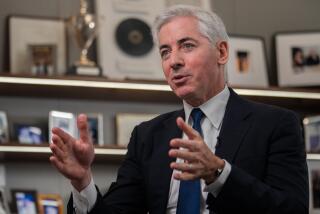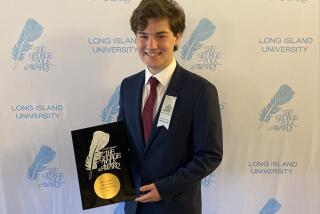Questionable Claims Might Produce Trouble for Ceryx
- Share via
SANTA PAULA — What had been a good year for Ceryx Inc. and its president and chief executive, Dorriah L. Page, was getting even better.
The state in June awarded the company a $632,000 research grant, and a month later a company news release announced that the Economic Development Collaborative of Ventura County had named Page entrepreneur of the year.
For the record:
12:00 a.m. Dec. 29, 2000 For the Record
Los Angeles Times Friday December 29, 2000 Ventura County Edition Metro Part B Page 2 Zones Desk 2 inches; 38 words Type of Material: Correction
Turbodyne product--A Times story on Dec. 5 about Dorriah L. Page, president and chief executive of Ceryx Inc., contained incorrect information about a company where she previously worked. Turbodyne Inc. makes turbochargers that help reduce diesel engine emissions.
For the Record
Los Angeles Times Saturday January 20, 2001 Ventura County Edition Metro Part B Page 3 Zones Desk 1 inches; 31 words Type of Material: Correction
Ceryx Inc.--A Dec. 5 story on Dorriah L. Page, chief executive of Ceryx Inc., contained incorrect information about her company. Ceryx does hold at least one federal patent, but not for its QuadCAT catalytic converter.
But there was a hitch. “Our organization did not give her the award,” said Joe McClure, head of the collaborative. “She made a mistake.” In fact, the award was presented not by the collaborative but by the Ventura County Boy Scouts Council, which made much of its decision based on Page’s resume.
A Times investigation of that resume and other company claims, however, shows that a number of assertions Page has made about herself and Ceryx, which makes smog-reducing filters for diesel engines, are questionable. Those disputed assertions, ranging from her educational background to her statements about the company’s patent holdings, have prompted concerns among state officials and business analysts.
Page said the disputed claims are simple mistakes, misunderstandings that have been overblown.
Concerns over credibility, however, could have far-reaching effects for Page’s company, a privately held firm that is courting potential investors, several business and stock analysts said.
Indeed, Page may have difficulty finding a bank to help Ceryx go public if financial leaders believe she has misrepresented herself, said Greg Salchow, an auto industry analyst at Raymond James & Associates in Detroit.
“A significant number of top-flight firms will not underwrite such an offering unless senior management has a perfect resume,” Salchow said. “If there’s any misrepresentation, most will not.”
McClure, who said he and the Economic Development Collaborative helped find workers for Ceryx, agreed there could be problems for Page and the company. “If the allegations [about her resume] can be substantiated, then I will be very concerned about her credibility.”
*
The questions surrounding Page and Ceryx include:
* The company’s Web site and promotional materials tout “the patented Ceryx QuadCAT Four-Way Converter.” In its application for the state grant, Ceryx also called the QuadCAT patented. But U.S. Patent and Trademark Office records show that Ceryx has no federal patents. Page acknowledged the patent is pending.
* Company news releases state that a Ceryx catalytic converter has been certified for use in Sweden. But Swedish government officials said nothing has been approved.
* Ceryx news releases and Page have said that she holds several patents. But U.S. Patent and Trademark Office records show that Page holds no patents.
* Page says she is a founder of Turbodyne, a Carpinteria-based company that makes catalytic converters for diesel engines. “No way, not even close,” said Edward Halimi, Turbodyne’s founder. In 1997, Turbodyne sued Page, claiming she had misrepresented her background to the company when it hired her in 1995. Page and the company reached a confidential settlement in 1998.
* In her resume and company documents, Page said she received a PhD in civil engineering from UC Davis and was an associate professor. Records show Page’s degree is in ecology, and that she worked as a teaching assistant.
* Page said she is a member of the National Academy of Sciences and the American Society of Civil Engineers. But officials at both groups said she is not a member.
* In a Ceryx news release, the company asserts it is involved in an extensive state program to “retrofit thousands of school buses with Ceryx technology over the next year.” But California Energy Commission officials said this is not the case. A lawyer representing Page said the company’s statement was a mistake.
Ceryx did receive a state grant in June to develop and test its QuadCAT catalytic converter for diesel engines. But there is no specific program that will pay Ceryx to retrofit school buses with the company’s catalytic converters, said Susan Brown, manager of the technology division for the energy commission.
“It’s premature to say we’re going to use” Ceryx, Brown said.
In fact, Ceryx has not even started its production line. Although initial test results of the company’s catalytic converters “look very promising,” Brown said, Ceryx has a long way to go before its product would be considered for purchase.
State officials won’t know until January if Ceryx’s converters pass tests at certified labs, Brown said. Even then, she added, the state’s “clean school-bus program” is still being developed, and state schools haven’t received any money to retrofit buses.
When asked about assertions made by the company regarding Ceryx’s relationship with the state, Page said, “I didn’t write that, but we are moving ahead very aggressively for a program with the state. Our goal is to retrofit many thousands of buses.”
After repeated queries about inconsistencies in Ceryx’s assertions about its products and her own background, Page acknowledged, “We need to clean up our documentation and make sure it’s accurate.”
Concerning her academic record, Page said, “I’ll be honest with you, I haven’t had this kind of scrutiny. . . . I’ve amended all the documents that list my degrees.”
Page acknowledged that her doctorate is actually in ecology, but said, “That doesn’t mean anything. It’s like saying you’re a medical doctor, but what’s your specialty?”
As for the discrepancies regarding her professional affiliations, Page said she thought she was still an active member but that her membership may have lapsed.
And in regard to news releases that say Page and Ceryx hold several patents, she said she has one patent in her name and the company owns one patent and has the license on two other inventions. Patent office records, however, indicate nothing in her name.
The statements made by Page and Ceryx are troubling to Manuel Asensio, a New York trader and investment analyst who first uncovered problems concerning Page’s relationship with Turbodyne, the company she said she helped create. He said he was surprised Page would even mention her association with the company.
“That is a glaring misrepresentation,” Asensio said.
*
Misleading information also makes analysts like Salchow leery.
“If I cannot depend on the information the company provides me to be accurate, I can’t do my job,” Salchow said. “There’s a rule of thumb in the business, I think it’s a Latin phrase, that says untruthfulness in one thing usually means untruthfulness in all things.”
Questions about the credibility of management at Turbodyne, which also made catalytic converters for diesel engines, caused the company’s stock to crash and eventually be taken off the Nasdaq exchange. It is now the target of several class-action lawsuits by shareholders.
Halimi said he and other company veterans are outraged that Page continues to assert that she started Turbodyne. It’s “absolute nonsense,” he said.
Page worked at Turbodyne from Sept. 1, 1995 until Aug. 28, 1997, said Ken Fitzpatrick, head of investor relations for the company.
Page insisted she helped found Turbodyne and blamed Halimi and other company officials for Turbodyne’s current problems. She said she, Halimi and Leon Nowek, a former Turbodyne executive, started the company. “Ed was the CEO and Leon the CFO. I was vice president of something, I don’t know exactly. I was one of the founders.”
She noted her role at Turbodyne on her resume because “I was there so long,” she said. “I couldn’t explain a four-year gap in my work history.”
While Turbodyne tried and failed to develop its catalytic converter for diesel engines, Ceryx could actually successfully bring a product to market, experts and even some competitors said.
If Ceryx’s converter is for real, there is no limit to where Ceryx could go, said William Burke, chairman of the South Coast Air Quality Management District.
Right now, Ceryx’s technology exists only in experimental form. The company has 60 employees, Page said.
Page said she has worked very hard to get the company this far, and she relied on her connections to make it happen. But Turbodyne officials said she made similar claims while there. Those claims led to their suit against her.
In 1994, at the same time Page said she was helping to found Turbodyne, she was selling cars at a dealership in Westlake Village, according to records in two lawsuits filed in Ventura County.
After Page left Turbodyne, the company sued her for fraud, breach of contract and defamation. The company paid her $105,000 a year and gave her options for 100,000 shares of stock, all based on her promises and claims in her resume that turned out to be false, the lawsuit said.
*
Page, the suit said, claimed she was an expert in securing grants and could get the company $2 million. The grants never materialized, the suit said. Also, she said she had a PhD at the time she was hired, which was false, the suit said.
So far, she has the support of Ceryx’s four-person board of directors.
Board members were reluctant to comment on Page’s resume and the company’s news releases, saying they wanted to personally look into questions regarding her background and claims before commenting.
Board Chairman Donald Skinner said he was unaware Page had been sued by Turbodyne.
“Honesty is a key part of doing business, period,” Skinner said. “Something that could come out that could damage the company, and its potential is very much a concern.”
After numerous inquiries by The Times about news releases and statements made on the company’s Web site, Ceryx officials said they sought to correct and change several discrepancies.
However, even after those statements were made, many discrepancies remained on the Web site, and other company documents contained other potential inconsistencies.
Page said potential investors, state officials and taxpayers whose money went toward the grant she received shouldn’t be concerned about the discrepancies regarding her and Ceryx.
“They should be concerned about whether I can get the job done and whether I can get the technology to market,” she said.
Analysts disagree. Michael Bruynesteyn, an automotive industry analyst at Prudential Securities, said any questions about credibility will be of paramount interest to investors because “these are the people that are managing your money.”
If Page misrepresented herself in any way, added Salchow, “are the facts correct that they’d build catalytic converters at the price they say they can?”
*
VIRTUAL VEGGIES
Dole Food Co. has chosen Tradingproduce.com to handle its online vegetable business. B7
* MORE BUSINESS NEWS: B6-9
More to Read
Inside the business of entertainment
The Wide Shot brings you news, analysis and insights on everything from streaming wars to production — and what it all means for the future.
You may occasionally receive promotional content from the Los Angeles Times.










